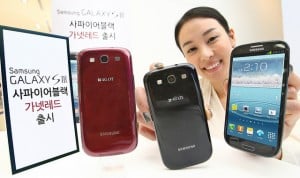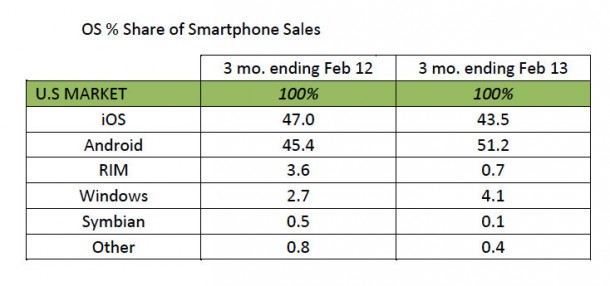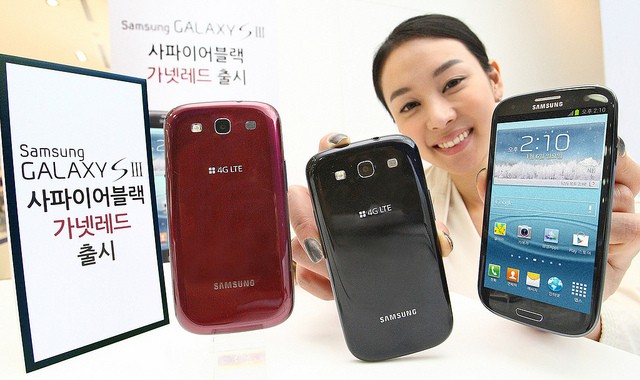
It seems like every other day we’re seeing smartphone market share and sales reports. Though the numbers themselves vary, the end result has typically been the same: Android is gaining share in the U.S. at the expense of iOS (predominantly the iPhone).
The latest comes from Kantar Worldpanel ComTech (interesting name). For the three month period ended mid-February 2013, Google Android accounted for 51.2% of sales in the U.S. smartphone market. That’s an increase of about 6%. Meanwhile Apple iOS fell to 43.5%, a drop of 2.5% during the period.
Microsoft continues to remain relevant, and took third place once again in the U.S. with 4.7% of all smartphone sales. That might not sound like much, until you run some quick math and realize it’s a 123% increase. Windows Phone 8, likely not to threaten iOS or Android in a big way anytime soon, has proven a popular draw with certain buyers in the smartphone market.

BlackBerry (formerly RIM) came in at 0.7% of all sales from mid-November through mid-February, despite a large marketing push for its newly released BlackBerry 10 platform. The lack of a low-priced handset in emerging markets could cause further trouble over time; notably Android is well positioned with cheaper offerings in traditional global markets dominated by BlackBerry in the past.
According to Kantar, Verizon remained the top carrier, taking in 35% of all smartphone sales.
What to make of the results?
One surprise is Microsoft. At this point Windows Phone 8 appears to be a respectable (though niche) alternative to both iOS and Android. Not too bad for a company that was completely out of the mobile race just a few years. The likelihood of me giving up Android (and Nexus 4) in favor of anything else is close to zilch. But, for many, WP8 offers an aesthetically pleasing interface (expect others to borrow from the tile-based concept) and is very easy to use (especially in comparison to the learning curve required for BlackBerry’s confusing array of gestures). To those eager to write-off Microsoft’s mobile strategy, don’t count your chickens until they hatch… or something like that.
And next?
I don’t think a new iPhone–the 5S–will change the results much (we should see it this summer). Yes, there will be a slight uptick in sales. However, the market is saturated. Buyers who want an iPhone have an iPhone. Many are in the middle of two-year contracts, and refresh every other year.
A potential market disruptor: if Apple comes through with a low-cost, plastic iPhone. That could change the game by offering those who would otherwise opt for a cheap Android an alternative with cache.
Another potential game-changer if Samsung introduces its own mobile OS, and abandons Android. I doubt this would happen in 2013. And I’m still skeptical Samsung could amass the kind of developer support that Android and iOS command – look at Microsoft and the challenges its had in that regard. Those surveying the mobile landscape and doing a little armchair quarterbacking cannot deny the possibility.
One thing is certain in technology and the nascent mobile market: anything could happen.


